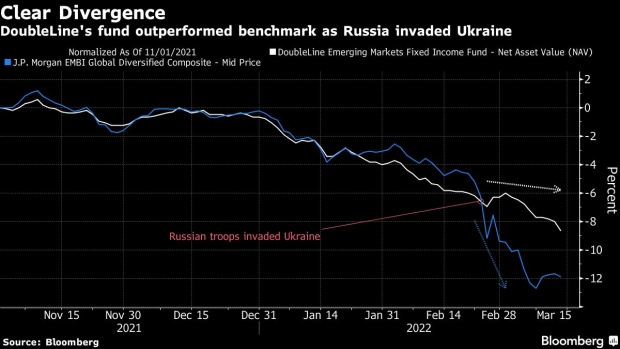Mar 15, 2022
DoubleLine Is Betting on Latam Bonds After Dodging Russia Risk
, Bloomberg News

(Bloomberg) -- A world-beating emerging bond fund from Jeffrey Gundlach’s DoubleLine Capital LP is looking for bargains in Latin America after outperforming peers with an unusual strategy that insulated it from Russia’s war in Ukraine.
The $759 million DoubleLine Emerging Markets Fixed Income Fund (DBLEX) has beaten 97% of peers over the past month by embracing under-valued and better-quality credits in places like Colombia and Brazil, while avoiding pockets of riskier debt, its managers said in an interview. The fund exited Russian debt after the annexation of Crimea and has avoided other bonds from nations in the region -- a strategy that stands in contrast to some of its biggest competitors such as Pacific Investment Management Co., BlackRock Inc. and Ashmore Group Plc.
“We dodged Eastern Europe exposure, but at the same time we’re looking at Latin America, in general, which tends to benefit from the high-price cycle in commodities,” said Mark Christensen, who manages the fund alongside Luz Padilla and Su Fei Koo.
Nonetheless, the fund has lost 2.8% over the past month. Still, it’s a slight decline when compared to the JPMorgan Emerging Market Bond Index’s 7.7% drop.
That leaves Christensen and his co-managers to sniff out the dislocations in emerging markets, where the selloff spurred by risk aversion is overdone. Colombia and Brazil fit into that category despite elections in both countries.
Even if anti-oil presidential front-runner Gustavo Petro takes power in Colombia, Koo said “there are institutional safe guards in place; he may not be able to get all his radical policies through congress.”
They also plan to keep avoiding Eastern Europe, at least for now. Christensen said they sold the fund’s holdings of Russian company bonds after Crimea’s annexation because of the sanction risk and unappealing valuations. Since the onset of the coronavirus pandemic two years ago, they’ve also been focusing on investment-grade holdings, leaving no room for lower-rated nations such as Ukraine and Belarus.
That left the fund in a strong position to weather conflict in the region, even if that wasn’t DoubleLine’s motivation.
“A full war breaking out in Ukraine was not our base case,” Christensen said. “We’re benchmark agnostics and so we didn’t need to be there.”
©2022 Bloomberg L.P.





